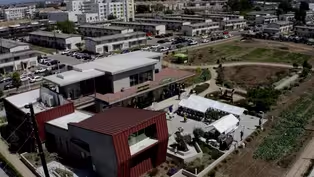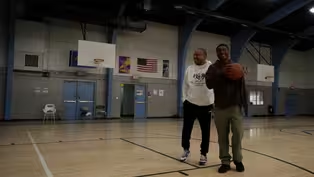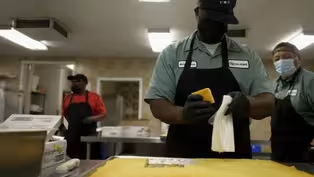
How Watts' Crisis Intervention Specialist Changes Lives
Clip: Episode 4 | 4m 5sVideo has Closed Captions
A crisis intervention specialist emphasizes the necessity of listening to those he serves.
Long before he was incarcerated, Thomas Dorsey Jr. felt he had no one to listen to him. Once out of prison, he made it his life's mission to give his community the support he always wished he had received but never did. He currently works as a crisis intervention specialist, where an important part of the job is simply listening to the people he's hoping to help.
Problems playing video? | Closed Captioning Feedback
Problems playing video? | Closed Captioning Feedback
10 Days in Watts is a local public television program presented by PBS SoCal

How Watts' Crisis Intervention Specialist Changes Lives
Clip: Episode 4 | 4m 5sVideo has Closed Captions
Long before he was incarcerated, Thomas Dorsey Jr. felt he had no one to listen to him. Once out of prison, he made it his life's mission to give his community the support he always wished he had received but never did. He currently works as a crisis intervention specialist, where an important part of the job is simply listening to the people he's hoping to help.
Problems playing video? | Closed Captioning Feedback
How to Watch 10 Days in Watts
10 Days in Watts is available to stream on pbs.org and the free PBS App, available on iPhone, Apple TV, Android TV, Android smartphones, Amazon Fire TV, Amazon Fire Tablet, Roku, Samsung Smart TV, and Vizio.
Providing Support for PBS.org
Learn Moreabout PBS online sponsorshipMan: My name is Thomas Dorsey, Jr., and I'm somebody's son.
I'm somebody's father.
I'm somebody's employee.
I'm somebodys supervisor.
Thing about it is that, I'm a human being first.
I went to Reseda High School, and I'll never forget my coach.
His name was Joel Schaefer.
I missed the school bus one day.
And he's like, "I'm gonna take you home," and we drove up.
I was so embarrassed.
My mom was drunk on the couch, and he woke her up and he told my mom, he said, "I'm gonna take Thomas with me, and if you say or do anything, I'm gonna call the cops on you.
I'll have them arrest you for neglect, because there's no way that he should be living like this.
He's 15."
My coach moved me in his house with his three sons.
One of the most painful days was when I graduated and I couldn't live with him anymore and I didn't have anywhere to go.
So I went back out into the streets, started gangbanging, selling drugs.
I got into a pharmaceutical disagreement with some gentlemen and some people got shot and some people got dead.
[Drumming rhythmically] I was in Soledad 180.
It's a level 4 maximum security, and I was out cleaning up.
And the guard was doing something up in the tower, up in the bubble.
He dropped his firearm and it hit the ground.
I walked over to it and I just looked up to him.
I said, "I'll stand right here until somebody comes.
I won't let nobody bother this."
And everybody is looking out the window like, "What?"
When the shift comes, you have to choose a side.
You're either with us or you're with them.
'Cause it ain't gonna be no middle stuff.
We don't play that.
Because, see, when I was growing up, I was never taught right from wrong.
I was taught good and bad, and I never knew how to differentiate between the two.
But there's a big difference.
When somebody said, "That's good," that's good to your perception, not to mine.
I want to know what's right, and I had to teach myself that.
And I knew what I was doing at that very moment, unconsciously, was the right thing to do.
And right after that, my whole life changed.
[Drum beating rhythmically] [Doorbell ringing] Dorsey, Jr.: Just a moment!
You say a person is a product from their environment?
I said it starts with the child.
I said, "Man, I can tell you of many a times, man, when my teachers actually told me, 'cause I asked too many questions, they put me in the back of the class."
Print your last name and your first name.
You know, now my confidence is shot, I have no focus, I have no direction.
So I was always angry, you know?
And my anger led up to me doing 35 years.
I had 17 to life, brother, and I was in prison.
I was mad.
No one wanted to listen to me.
And that's all I wanted was somebody to listen to me.
Don't give me your opinion about what you think I should do.
Just let me talk.
How you doing today?
And that's what's going on now.
The community is trying to speak.
Nobody wants to just let 'em speak.
You always want to-- "And now, we just gonna do this to you.
We're gonna make you do this," and it's like, "No, you're not listening," you know, and that's one of the reasons that when I was liberated, I made it a mission to not make it be about me.
That's why I reached out to Tim.
That's why I'm a Crisis Intervention Specialist today, because my whole thing is just, "Look, man, I just want to be here and just talk."
The things that WLCAC does, it's just about trying to help the community heal.
So my thing is just, I try to be a good soldier and I go where they tell me to go.
I never thought I could be as passionate as I am about anything.
I always wanted it when I was a kid, and I was thirsty for it.
Now it's like, I get up in the morning, I just want to help somebody else.
A Garden Grows In Watts (Preview)
Video has Closed Captions
Preview: Ep4 | 30s | MudTown Farms opens after twelve years and the community comes out to celebrate. (30s)
Overcoming Physical Disability with Basketball
Video has Closed Captions
Clip: Ep4 | 2m 24s | Watts youth recounts overcoming the loss of his limbs to excel in school and athletics. (2m 24s)
Providing Watts' Elders with Thousands of Meals
Video has Closed Captions
Clip: Ep4 | 3m 33s | WLCAC's Nutriton Program Director describes how grateful he is to serve his community. (3m 33s)
Providing Support for PBS.org
Learn Moreabout PBS online sponsorshipSupport for PBS provided by:
10 Days in Watts is a local public television program presented by PBS SoCal


















